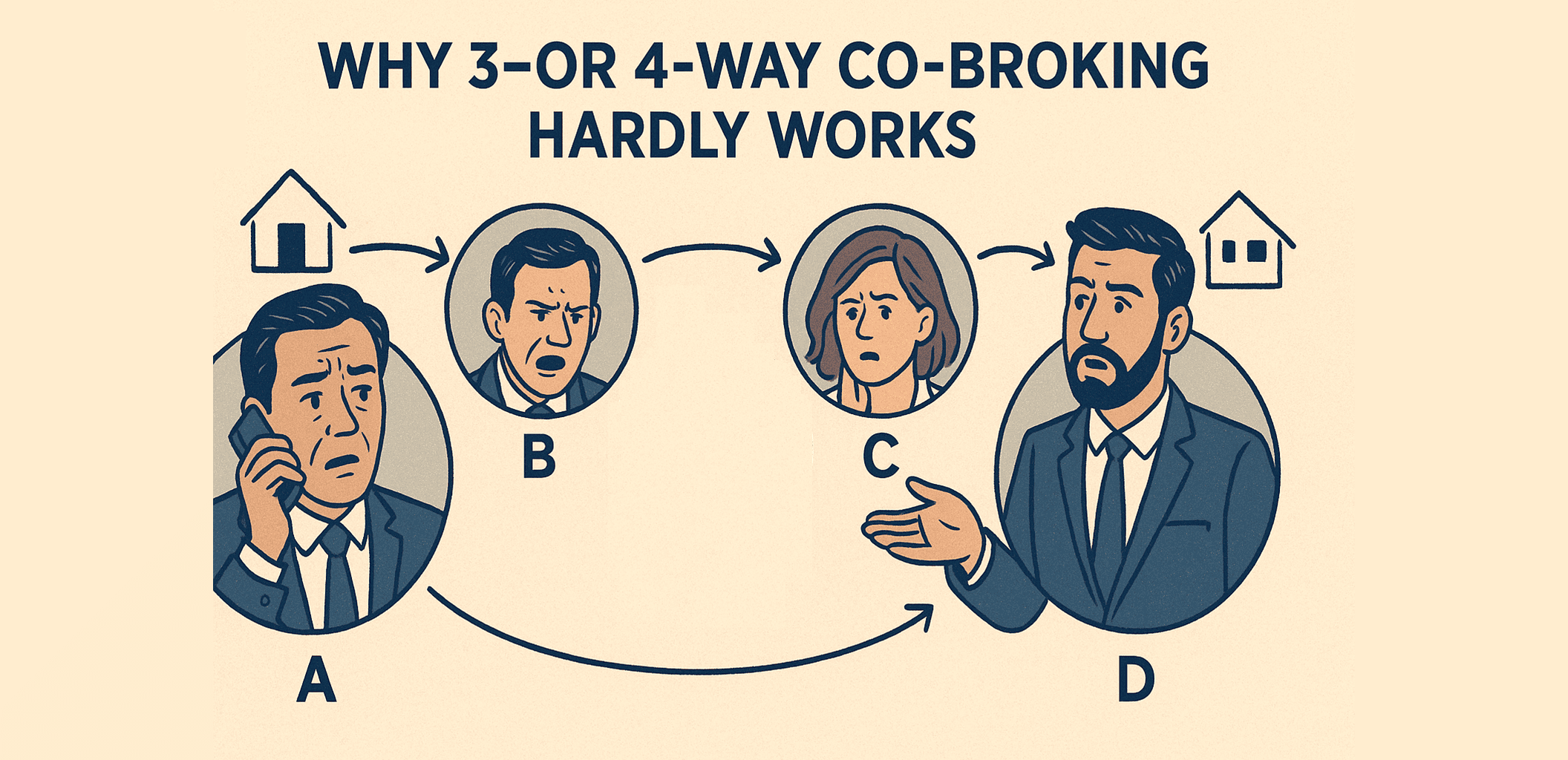Why 3- or 4-Way Co-Broking Hardly Works

On paper, multi-agent co-broking sounds brilliant.
“If everyone brings their own network, we can close deals faster!”
So, imagine this:
- Agent A has the listing
- Agent D has the buyer
Enter B and C — the “middle links.” Maybe B knows A, and C knows D. Now the chain looks like this:
A → B → C → D
In theory, it’s a powerful network. Each person extends the reach — A’s listing now travels through B, C, and finally reaches D’s buyer.
But in reality?
Every extra link weakens the chain.
Deals move slower, messages get distorted, and commission disputes are almost guaranteed.
Here’s why 3- or 4-way co-broking rarely works, no matter how good your intentions are.
1. The Illusion of Network Power
At first glance, this setup looks impressive. Four agents, four networks, one goal — sell the property. But property deals aren’t about reach — they’re about clarity, speed, and trust.
The more hands you pass the ball through, the higher the chance someone drops it.
What looks like “expanded coverage” quickly becomes a communication maze, where everyone assumes someone else is following up.
By the time the message reaches the buyer, half the details have already changed.
2. The Telephone Game Problem: Distorted Messages
Think of it like the old classroom game — whisper a sentence through five people, and see how it ends up.
In a 4-way co-broke, it often goes like this:
- A tells B: “The owner wants RM950k, slightly negotiable.”
- B relays to C: “The owner might take RM930k.”
- C tells D: “The owner accepts RM900k.”
By the time it reaches the buyer, the message becomes:
“RM900k firm.”
One deal, four people, and total misalignment. Even if everyone acts in good faith, every handoff loses about 10% accuracy.
Multiply that by four, and you’re left with confusion, mistrust, and wasted effort.
3. The Fairness Trap: “We All Deserve Equal Share”
Next comes the hardest part — splitting the pie.
When four agents are involved, most expect an equal 25% each.
But ask yourself:
Did B or C actually do 25% of the work?
In many cases, the middle agents only passed a phone number or forwarded a message.
No viewing, no negotiation, no follow-up, no admin.
Yet they demand the same share as the agents who handled the real work.
This is where deals break down — resentment and disputes take over. Without a structured entitlement system, multi-party co-broking ends in arguments, not agreements.
4. The Response Delay: Too Many Middlemen
Real estate deals run on speed.
But add more middlemen, and everything slows to a crawl.
A simple viewing request turns into a relay race:
D → C → B → A → Owner
Owner → A → B → C → D
Each round trip takes hours — sometimes days. By the time D gets confirmation, the buyer has lost interest or found another agent.
Every layer adds delay, and delay kills momentum. No serious client will wait three days just to view a unit.
5. The Trust Deficit: “Who Actually Holds the Mandate?”
In long chains, no one truly knows who controls what.
D (buyer’s agent) isn’t sure A even has a genuine mandate.
A (lister) isn’t sure D has a real buyer.
B and C are simply hoping they’ve connected the right people.
So D spends hours servicing a lead… but silently worries:
“Even if I close this, will I get paid?”
Without visibility into ownership, authority, or agreements, motivation dies. No one wants to work hard on a deal that might never pay.
6. The Root Problem: Informal Co-Broking Has No Structure
Here’s the truth:
You can’t manage multi-party deals with WhatsApp alone.
In informal setups:
- Roles are unclear
- Work overlaps
- Payment rules don’t exist
- Accountability disappears
You can’t build serious cooperation on handshakes and screenshots. You need a system that assigns roles, tracks actions, and enforces fairness.
7. The Solution: Structured Co-Broking with Role-Based Entitlements
To scale cooperation beyond 1-to-1, you need structure — not chaos.
That’s exactly why ListingMine ERP was built — with ACN (Agent Cooperation Network) architecture.
It enables multi-agent deals through clear roles and automated commission logic.
In ListingMine ERP:
- Admins can create custom roles (e.g. Lister, Buyer Closer, Doc Verifier, Loan Officer).
- Listers define commission splits upfront, so everyone sees the same numbers.
- Every participant tracks the same progress, documents, and updates.
- Upon completion, the ERP auto-issues commission splits as defined.
✅ No confusion
✅ No fights
✅ No broken promises
It transforms messy 4-way chains into coordinated, documented teamwork,
so every contributor gets credit and commission fairly.
8. Why 1-to-1 Co-Broking Isn’t Enough Anymore
Even 2-party co-broking has its limits. There’s still mistrust, and network reach is capped.
To truly scale, you need more people working together — but with structure, not chaos.
When multiple agents contribute — from marketing to finance to closing — you need role-based cooperation, not “equal share by guesswork.”
The future isn’t less collaboration. It’s better collaboration, powered by clarity.
Final Thought
3- or 4-way co-broking looks like teamwork — but in practice, it’s a web of distortion, delay, and doubt.
More agents ≠ more efficiency — unless roles and rewards are clearly defined.
If you truly believe in collaboration, stop relying on WhatsApp chains. Start building structured cooperation that protects everyone’s effort.
That’s exactly what ListingMine ERP is designed for — Malaysia’s first ERP with ACN capability to make co-broking transparent, fair, and fast.











































































































